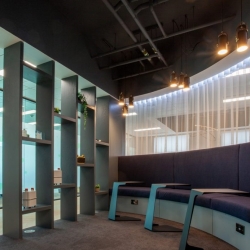To provide the best experiences, we use technologies like cookies to store and/or access device information. Consenting to these technologies will allow us to process data such as browsing behaviour or unique IDs on this site. Not consenting or withdrawing consent, may adversely affect certain features and functions.
The technical storage or access is strictly necessary for the legitimate purpose of enabling the use of a specific service explicitly requested by the subscriber or user, or for the sole purpose of carrying out the transmission of a communication over an electronic communications network.
The technical storage or access is necessary for the legitimate purpose of storing preferences that are not requested by the subscriber or user.
The technical storage or access that is used exclusively for statistical purposes.
The technical storage or access that is used exclusively for anonymous statistical purposes. Without a subpoena, voluntary compliance on the part of your Internet Service Provider, or additional records from a third party, information stored or retrieved for this purpose alone cannot usually be used to identify you.
The technical storage or access is required to create user profiles to send advertising, or to track the user on a website or across several websites for similar marketing purposes.
 Despite the financial hardship wrought by COVID-19, half of employers (49 percent) don’t have a financial wellbeing policy. This is according to the latest Reward Management Survey from the CIPD (which 420 employers responded to). (more…)
Despite the financial hardship wrought by COVID-19, half of employers (49 percent) don’t have a financial wellbeing policy. This is according to the latest Reward Management Survey from the CIPD (which 420 employers responded to). (more…)








 Employees who find their job meaningful increase the likelihood of better performance reviews by suggesting ways of improvement for their companies, claims research from
Employees who find their job meaningful increase the likelihood of better performance reviews by suggesting ways of improvement for their companies, claims research from 
 The feelings of isolation being experienced by employees is the biggest concern IT and cybersecurity teams have around home working, say almost one third (31 percent) of respondents to the latest Twitter poll run by
The feelings of isolation being experienced by employees is the biggest concern IT and cybersecurity teams have around home working, say almost one third (31 percent) of respondents to the latest Twitter poll run by 
 According to new data from
According to new data from 
 New data from real estate consultancy
New data from real estate consultancy 
 r workplace digital transformation and the urgent shift to remote working has seen the world experience two years of digital transformation in two months. New research from
r workplace digital transformation and the urgent shift to remote working has seen the world experience two years of digital transformation in two months. New research from 
 The circular economy is the ‘holy grail’. Few people would deny the ambition of keeping resources in use for as long as possible, extracting the maximum value from them, then recovering and regenerating products and materials at the end of each service life. Is this achievable within the furniture and furnishings sector? Many manufacturers and suppliers can justifiably boast impressive ‘green’ credentials, such as manufacturing techniques, the use of innovative and sustainable materials as well as recyclability of products. The production and supply of new furnishings doesn’t address, however, the short and longer term issues relating to sustainability. ‘Cradle to cradle’ is a great concept – but who is responsible?
The circular economy is the ‘holy grail’. Few people would deny the ambition of keeping resources in use for as long as possible, extracting the maximum value from them, then recovering and regenerating products and materials at the end of each service life. Is this achievable within the furniture and furnishings sector? Many manufacturers and suppliers can justifiably boast impressive ‘green’ credentials, such as manufacturing techniques, the use of innovative and sustainable materials as well as recyclability of products. The production and supply of new furnishings doesn’t address, however, the short and longer term issues relating to sustainability. ‘Cradle to cradle’ is a great concept – but who is responsible? 
 The
The 
 Generating £27.8 billion gross value added annually, and employing more than 360,000 people, the West Midlands is the UK’s largest centre for business, professional and financial services (BPFS) outside London. Now, business leaders from Shoosmiths, Wesleyan, Bruntwood CBRE amongst others, are working with the region’s just under 12,500 leading tech and digital companies to see how they can integrate AI and advanced technology into their everyday activities.
Generating £27.8 billion gross value added annually, and employing more than 360,000 people, the West Midlands is the UK’s largest centre for business, professional and financial services (BPFS) outside London. Now, business leaders from Shoosmiths, Wesleyan, Bruntwood CBRE amongst others, are working with the region’s just under 12,500 leading tech and digital companies to see how they can integrate AI and advanced technology into their everyday activities. 
 How good your line manager is makes the difference between an employee coping or struggling in lockdown. But too often line managers’ heroic efforts are not noticed by their employers, claims new report, titled
How good your line manager is makes the difference between an employee coping or struggling in lockdown. But too often line managers’ heroic efforts are not noticed by their employers, claims new report, titled 
 Outdated attitudes towards technology amongst senior facilities management business leaders are at risk of jeopardising future business survival, claims new research by
Outdated attitudes towards technology amongst senior facilities management business leaders are at risk of jeopardising future business survival, claims new research by 








March 5, 2021
A shift from competition to community has never been more important
by Hannah Koole-Browne • Business, Comment